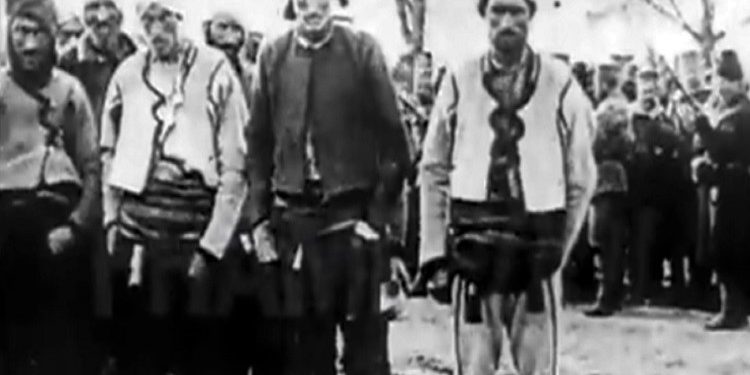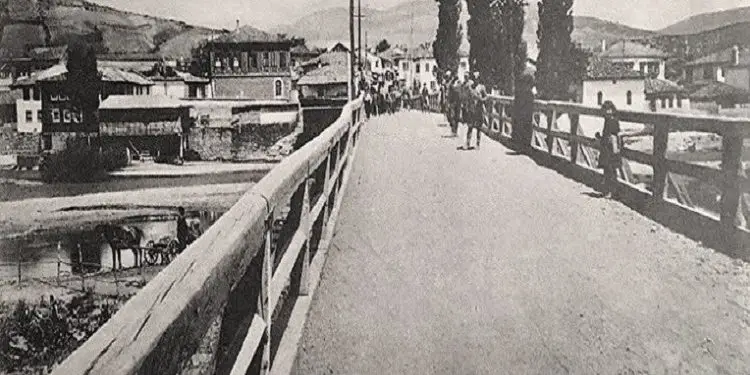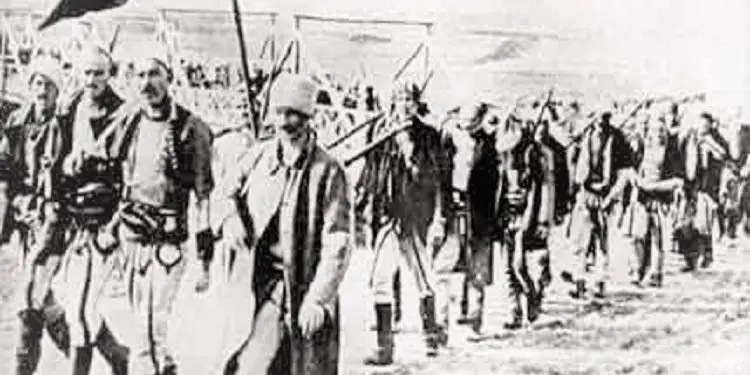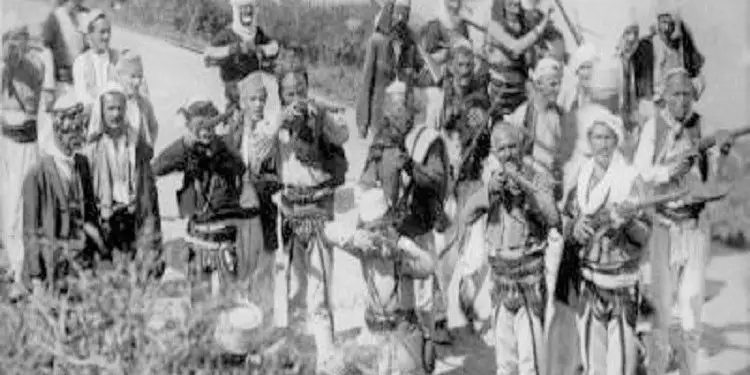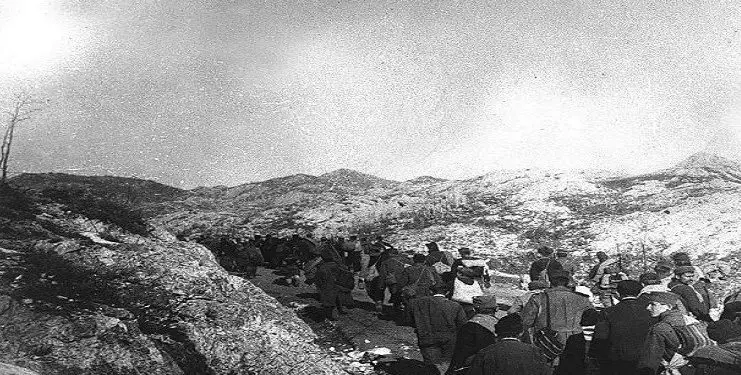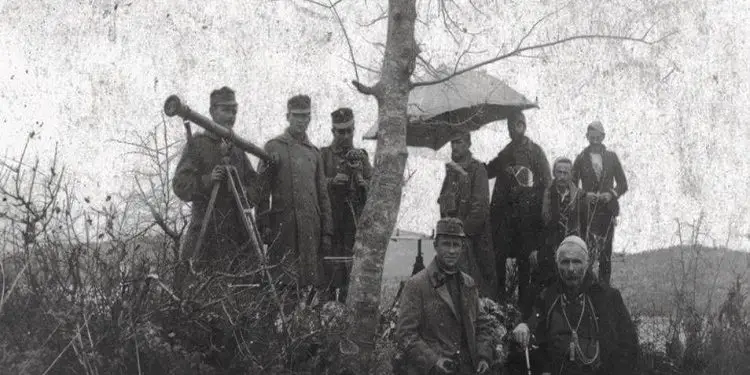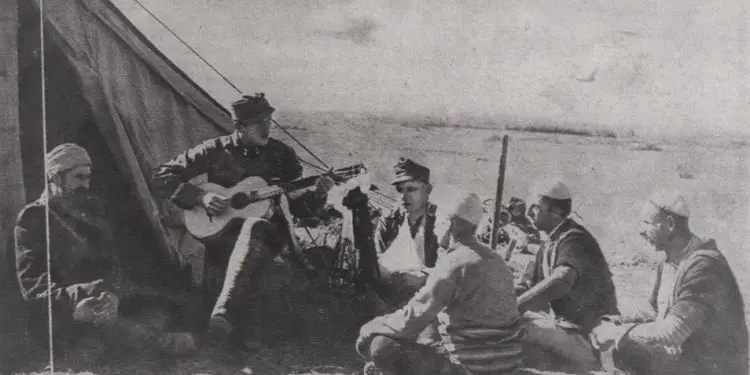From Bashkim Trenova
Part nineteen
MYTH-MYSTICISM, VICTIMOMANIA, RACISM AND SERBONOSTALGIA
ALBANIANS ACCORDING TO THE SERBS
(THE EASTERN CRISIS AND THE BALKAN WARS)
Memorie.al / “Serbs are descended from the Slavs, a large number of tribes who gave life to the Slavic peoples. Knowledge about the origins of the history of the Slavs is modest and not so clear. Their name appears for the first time in the 6th century AD, when Byzantine writers start talking about the Slavs….”! (Dushan Bataković, Milan St. Protic, Nikola Samardžić, Aleksandër Fotic. History of the Serbian People. L’Age d’Homme. Lausanne. 2005. Pg. 3.)
Vladan Jovanović – scientific associate, lecturer in specialized postgraduate programs in the field of mediation at the Faculty of Political Sciences in Belgrade, lecturer, etc.:
The militarization of the area came as a result of poor security in the border areas with Albania and Bulgaria, which was practically inherited from the last years of the Ottoman Empire. The problem of the armed Albanian population (which also dates from Turkish times) threatened the very constitutional order of the Serbo-Croatian-Slovenian Kingdom. Due to this problem, the forces of the army and the police were constantly mobilized, until 1924, when the refuge of the Kachaks in Drenica was destroyed with the help of artillery fire.
On the other hand, the colonists were systematically armed from the warehouses belonging to the Agrarian Offices, since they were the most frequent victims of illegal attacks. Only after the incident in Llap, when the Serbian colonists sold large quantities of weapons to the Albanians, it was decided that they should also disarm. The sincerity of the concept of disarmament in Kosovo was seriously questioned when, during the electoral campaign of 1927, the head of the government electoral list distributed 500 rifles to Albanians in Gjilan. Simply put, complete anarchy. As I was going through the archive documents, I got the impression that the government deliberately turned those people in Kosovo against each other and, moreover, it constantly switched sides, alternately, for the colonists and for the Albanians.
During the pursuit of the armed gangs, an uncontrolled crackdown was carried out in entire villages, which brought additional concern to all sections of the population. The Albanians eventually did not trust the state, the Serbian Government, supported by the army, decided on November 25, 1915 to leave and go, to recover, to the Albanian coast. The retreat was made in mid-winter through the snowy peaks of Montenegro and Northern Albania.
It was a real exodus not only of the army, but also of Serbian institutions such as the National Assembly, the Court, the government and a mass of civilians. The retreat took place under enemy fire, including that of hostile Albanian tribes. Hundreds of thousands of soldiers, officials and civilians walked for two months, almost without food, through Montenegro and Albania towards the Adriatic. (1)
1 – Vladan Jovanovic. The colonization of Kosovo. (Colonization of Kosovo). Peščanik. Night, 08.04.2013.
****
Vojislav Pavlović – researcher at the Institute of History of the Serbian Academy of Sciences and Arts, professor at the University of Belgrade, director of the Institute for Balkan Studies SASA, etc.:
****
Mr. Pukovnika Horvatovic – senior military officer:
While the district of Kurshumli, with the departure of the Albanians, was left without inhabitants… At the end of this, I have the honor to remind your excellency of this: Arnautlëku of the district of Leskovci, was left without inhabitants, the dignity of the Serbian people before the civilized world must be saved and democratic of Europe, whose dignity Balkanikus and dr. Vladan has been given a heavy blow, coming out with their brochures before the European public. Their barbaric theory about the Albanians is a faithful reflex, an accurate reflection before Europe of the barbaric practice that our army has followed in Albania. And we must not allow these unexplained people to maintain the impression that the cannibalistic theories of Balkanicus and Vladan are an expression of the thoughts and feelings of the entire Serbian people. It must be shown that in Serbia there are people, there are many people, who think completely differently from them, and that at the forefront of them stands the proletariat, stands Social Democracy. (2)
1 – Vojislav G. Pavlovic. La France et l’espace youugoslaves : la naissance de la Yougoslavie (1878-1918) – France and the Yugoslav space; the birth of Yugoslavia (1878-1918) – Balkanološki institute SANU, Jan. 1 2015. Pg. 254.
2 – Mr. Pukovnika Horvatovic: AS. PO, K- 29, br. 146 Niš 15, October 1878, government commissioner, savetnik V. Vujović, Serbian prince of commander Milana Obrenovića. (Mr. Colonel Horvatovic: AS. PO, K-29, no. 146 Nis October 15, 1878, government commissar, adviser to V. Vujovic, prince and Serbian commander Milan Obrenovic).
Media:
Borba; 16.10.1913:
Even the second expedition against Albania ended with the complete defeat of the Serbian government. On October 5, Austria-Hungary sent an ultimatum to Serbia, ordering it to withdraw all its troops from the territory of autonomous Albania within 8 days. Stunned and frightened by the sudden step of Austrian diplomacy, the obedient Serbian government declared that it would immediately act on the order; and so, while our neighbor sits with his fist raised over his head, our troops, who wasted all that blood on strategic points, retreat quickly and in shame from whence they came. We did not expect another end.
Borba; 16.12.1914, pp. 130-131:
****
Politics; 5.9.1912:
The Arnauts will not go unpunished for their attacks and what they are doing will only hasten the death of the state they want to create.
—
Politics; 7.9.1912:
If Albanian bandits will continue to attack our borders and send agents to incite the population to revolt, we will be forced to cross into Albanian territory to carry out the mission that Europe could not carry out.
—
Politics; 7.9.1913:
Our troops left the most beautiful memories in Albania. The Austrian and Italian agents now take advantage of the departure of our troops from Albania and raise the Arnauts, to whom the Serbian army did no harm and nothing bad.
—
Politics; 9.9.1913:
It is hard to find, even in the Austrian press, so many planned frauds and slanders, which have to do with the situation in Albania and with the Arnaut attacks on the Serbian territory. The Austrian government through its newspapers says that Serbia is guilty! Serbia, she says, has forbidden Arnaut widows from the bazaars of Prizren, Gjakova and other places, which “took away the tall Arnauts, and with this act sentenced them to death by starvation! Even if an Arnaut goes in the bazaars of these cities, the Serbian army does nothing but shoot at people.”
—
Politics; 13.9.1912:
We have to settle accounts with bandits. Deletion of accounts should not be temporary, but so radical that it does not occur to anyone to create concerns. Serbia must think for itself how to do this, taking into account only the interests of its people.
—
Politics; 20.10.1912:
In the morning, in the place where Ferizaj was the night before, there was a huge pile of rubble. Ferizaj disappeared; he now exists only on the map. Albanians paid dearly for their betrayal. —
Politics; 21.10.1912:
Finally, what every Serb was waiting for was fulfilled. The power of the people’s forces, which defeated the Turks in Kumanovo and which forever, broke the raging army in Kosovo and Sanjak, will lead the Serbian eagle through the gorges of the Drin and further into the Adriatic Sea. The sea! In this word is the entire strategic and tactical plan of our leaders, in it is the entire policy of our diplomats.
—
Politics; 22.10.1912:
With a special train that arrived in Belgrade this morning, 1069 prisoners were transported, mostly Arnauts. Arnauts leave a miserable impression. Among them there are old men and 14-year-old children. All who can bear rifles rose against us. Although they are poorly dressed and hungry, they do not because you pity. There is something wild, animalistic in their eyes. When you catch a glimpse of the captured arnaut, the picture of their crimes is immediately created before you. Before this panorama, regret disappears.
—
Politics; 22.10.1912:
This morning at the “London” hotel I met a child. He was 7 years old or not. He holds stones in his hand and plows forward. “Leave me uncle, please, so I can shoot them once too. They have shot our people enough!
—
Politics; 23.10.1912:
Whoever got up early yesterday to see the Arnaut captives, who were brought to Belgrade, must have felt, with all the great disgust that the sight created, also a deep regret. Pain grips one when one sees these people – of whom little if any is said to be wild – going like country dogs before the cart, barefoot, naked like wild animals. Their state of mind, it seems, corresponds point by point to the misery and pain seen in their outward appearance.
—
Politics; 16.11.1912:
The High Command created the Serbian region under the name “District of Durrës”… Arnauts will receive all freedoms and in this true state freedom they will be ennobled. Serbia will thus realize a cultural work.
___
Politics; 16.11.1912:
“Xornale d’Italia” publishes a call of 80 Arberian municipalities in Italy, in which it is emphasized that Albania should be left to the Albanians. The Arbëresh renegades and quacks, which many decades ago moved to Italy to save their wallets and lives, are only now seeing a “great injustice”.
—
Politics; 23.11.1912:
In the Austrian press, the harshest voices are again being heard about the “crimes” committed by the Serbian troops during their advance towards Monastir and further towards the sea coast. There they slander without any shame just to prove that we are savages and that we have annihilated the Arnaut population in the occupied territories.
****
Radničke novine; 12.10.1912. Rubric “War”:
The Serbian army has so far mainly had skirmishes with the Arnauts, who, from their instinct for independence and free life, expressed so many times, feel that the “partition of Turkey” will be carried out at their expense, and therefore fight furiously. against those who wanted to overthrow their former ruler with their help, and then establish rule over their corpses. But as they are making a stout resistance, though they have neither sufficient arms, nor ammunition, and scarcely any cannon, a spirit of barbarism prevails in military circles, according to which they must be destroyed as energetically as possible.
—
Radničke novine; 6.11. 1912. Article – “Shame Spreads”:
The European press began to write about the atrocities of the war (which left a German correspondent with the impression of slaughter) and the barbarism being committed. Until now, in most cases, he has had a bad opinion about Serbs. Now he provides new material, with which he presents to the world the crimes of the committees, even of the army against the Albanians, crimes which could and should have been avoided.
“Daily Chronicle” wrote extensively about everything that was done against them. And, as much as we were convinced that there could be nothing in war but savagery and the most hideous and abominable scenes of some bloodthirsty types of beasts of war, we were also convinced on this side that they had been violated all the rules to a large number of people in the occupied areas, that a shame has been committed, which could cost us dearly.
—
Radničke novine; 18.12.1912:
The deserted families run away for 5, 6 and 10 days and, after half of them have died from the cold, hunger and fatigue, our army arrives and brings them back. Dead women, children and other desolate people are seen on the streets. It is painful to see how women die with their children in their arms. It has rained for three days and three nights, while these wretches walk day and night naked, barefoot, hungry and tired, and – those who can no longer continue from fatigue – die. But those who are left alive ask for help and cry for bread, but it is not given to them.
Then the comites, who are like filthy savages, seize them and torture them terribly. One holds the rifle while the other pushes the Turk with the knife, which he has put in his chest. The first stabs him with a knife and returns it to his friend, who stabs him again, and so on, 10, 20 times, until he dies. It’s terrifying to see what kind of heart these people have, the Serbian army exterminated the Albanians in Old Serbia and Albania, with a criminal belief that it was doing a “national” act, that by wiping out this population from the face of the earth, they were getting rid of the enemy, with whom it would be difficult to succeed in the future.
What are those desolate women and their children guilty of, these beautiful, innocent little angels? Speak, you answer, mother! Speak up and condemn the war that destroys your husbands, brothers, lovers, sisters and children, the “wild Albanians” disarmed and then released our soldiers, while our “civilized” army of the 20th century is killing children too Theirs.
—
Radničke novine; 22.10.1913:
—
Radničke novine; 15.1.1914:
This would be the last act of the continuous pursuit of a bad policy, which began with the extermination of the Arnauts in the new provinces, so that pure Serbian settlements would remain, then continued with the taking over of the provinces populated by the Arnauts.
Serbia has ceased to be a pure national state. She, like the others, against whom she spoke until today, has become conqueror and oppressor.
—
Radničke novine; 29.12.1914:
With many degenerate types and criminals leaving the regular troops, so that they could kill and slaughter freely, the comitats have caused a lot of damage to the population of the new provinces and shamed the Serbian people.
The most suspicious types are gathered in these squads. They give themselves the right to mercilessly sow death even on the innocent. For them, there is no question of property, nor that of bread and the daily needs of a poor family.
****
Self-help; 13.11.1912:
Only Albanians are an exception like this. A large part of them were against the Serbs, so, as a result, the fighting started against the Serbian army. In these battles occurred what, unfortunately, always resembles such cases, when the population rises with arms in hand against the victorious army. The Arnauts lost so much torua that they shot the soldiers even after they surrendered. They did this not only from forests, but also from houses in cities. Several hundred Serbian soldiers were killed in this way. Of course, this has not gone unpunished…
—
Self-help; 13.11.1912:
The Serbian army, when it came to these areas, did not touch any of those who responded to the power’s call and surrendered their weapons. But some Arnauts, after the surrender, meanly and cunningly shot the Serbian soldiers. Such was the case of Ferizaj, where the Serbian officer Amar and many Serbian soldiers were the victims of Arnaut infamy. They defended themselves and that’s all.
****
Vesnik srpske crkve; October-November- December 1912. Pp. 982:
In the Cathedral of Belgrade, the Lord Metropolitan Dimitrie spoke: … Let’s go to the glorious Kosovo, to the magnificent Decan, to the wonderful Skopje, to seek the throne of the mighty Dushan. Let’s go to Prilep. Our glorious knights have already departed, while I, as the supreme shepherd and spiritual father of the Serbian land, give the blessing.
—
Vesnik srpske crkve; October-November – December 1912. Pg.1012.
In some countries, our army has won amazing victories and conquered Kosovo. Thank you for your help so far, oh great Lord!
The entire territory from the border of the Serbian Kingdom to Gjevgjeli, Dojran, Lerina and the river Shkumbin in the south, as well as to the Adriatic Sea in the west…was occupied by the Serbian army.
By September 20, the second detachment of the army crossed the mountains of Albania and went to sea, in the Serbian Adriatic Sea. Military expeditions that can be compared to the Serbian march through Albania to the sea are rare in history: many insurmountable obstacles, horrors and suffering our army had to go through for a short but heroic time.
—
Vesnik srpske crkve; January-February 1913. Pp. 75:
The Serbian clergy is fulfilling its duty to the church and the people, since apart from those called by the military command, there were also priests who, in addition to their priestly duty, went voluntarily and with their presence gave heart to their brothers. By their selflessness they have won the admiration of the warriors and the thanks of the superior military authorities.
—
Vesnik srpske crkve; March-April 1913. Pp. 255:
The declaration of the war of liberation was received with enthusiasm, but it seems to us that no one welcomed the sacred cause of liberation with such enthusiasm as the Serbian priests. They rushed with crosses in hand to put themselves at the head of the brave Serbian army, to inflame the soldiers’ feelings with their speeches. Many priests are registered as volunteers and commies, and with cross and weapon in hand they annihilate the wild Asians. The newspapers are full of notices of the heroic attitude of some priests in the new war.
—-
Vesnik srpske crkve; March-April 1913. Page 268:
The representatives of the Great Powers in Belgrade on March 17 delivered a note, where they call on the Serbian government to lift the siege of Shkodra and to leave the occupied territories of Albania as soon as possible. At the same time, they think that immediate measures should be taken to ensure the true religious freedom of Catholics and Muslims of Albanian nationality.
This petition of the Great Powers regarding the borders of Albania, and even more, with religious freedom in the territories taken by the Serbian army, deserves every kind of punishment. The allied states of the Balkans are constitutional and independent states, where the rights of citizens are guaranteed by law to the fullest extent, such as the freedom of conscience and belief of all their citizens. It can be safely said that Serbia, in this direction, leads the way. There have been Mohammedans and Albanians in Serbia until now and they have enjoyed full civil and religious protection, so nobody has had anything to say in this regard. This request has found the general penalty.
As might be expected, Mr. Pasic, among other things, responded to this petition as follows: Regarding the request for a guarantee for the assurance of the Catholic and Muslim faith in the new provinces, the royal government declares that it cannot accept this request, as it is contrary to the right of state sovereignty.
—
Vesnik srpsk e church; March-April 1913. Page 270:
Gjakova, there in the Montenegrin part, has taken on a festive look. The people have gathered in front of the Montenegrin command. Over 600 souls! The Catholic priest from Gjakova called the bishop of Prizren, telling him that Montenegrin authorities have forced these people to abandon the Catholic religion.
And the bishop came together with a Catholic priest from the church of Prizren. They went to the captaincy to the Montenegrin ruler of the municipality, Mr. Plamenac. Mr. Plamenac received the pardon. With selected words, he addressed the people with the question: Do you seek to change your faith by your own will? Did someone force you? Are you afraid of anything?
And out of over 600 people, a total of 4 came out and declared that they will keep the Catholic faith. These four are relatives of the bishop. Catholic bishops cannot complain to anyone about their failure. With the greatest correctness, the Montenegrin authorities let them undertake everything that could help them. Memorie.al




